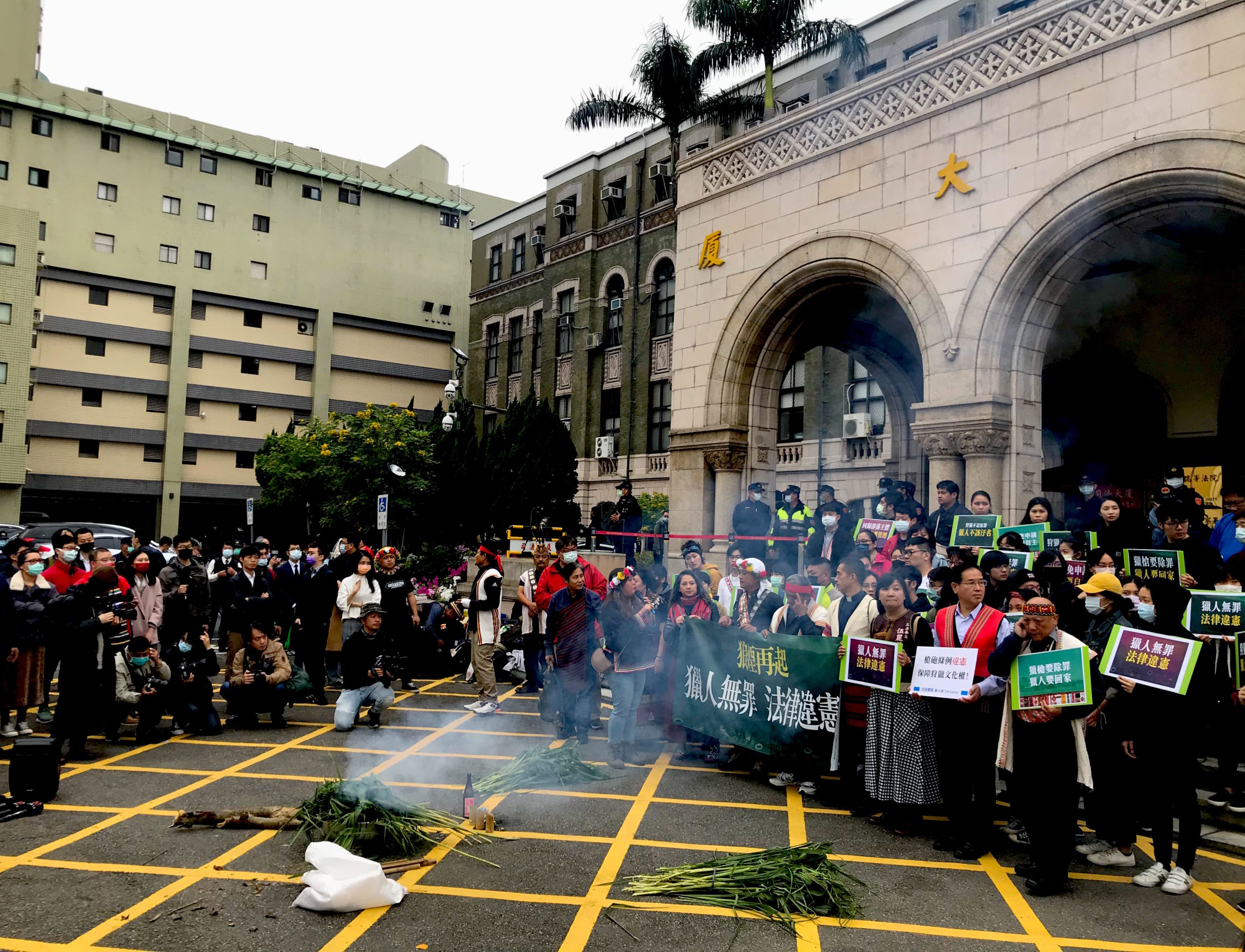by Brian Hioe
語言:
English
Photo Credit: Brian Hioe
AFTER CLOSE TO a decade, the Supreme Court moved to clear Indigenous Bunun hunter Tama Talum of a conviction on firearms possession and hunting of a protected Formosan Serow earlier this month.
The Tama Talum hunting conviction has been the major legal case in the past decade over Indigenous hunting rights, though it is not the only case in which Indigenous hunters were convicted on hunting charges. At stake in the case was the issue of protections in the law for Indigenous culture, inclusive of hunting rights, as this ran up against ROC law regarding firearms possession and protection of endangered species.
Talum’s full name in Bunun is Talum Suqluman, but referring to someone by the name of their father is a sign of respect in Bunun. Because Talum’s father’s name was Tama, this is why Talum is known as Tama Talum in most reporting on the case. Talum is also known by his Chinese-language name of Wang Guang-lu.
Facebook post by the Indigenous youth front on the ruling
In particular, Tama Talum was arrested for hunting with a shotgun to provide meat for his elderly mother, Cina, who was in her nineties. Tama Talum stated that his mother has poor health, that pork makes her sick, and that she is used to eating meat from the mountains and becomes sick from eating store-bought meat, hence his actions. Tama Talum did not deny his actions, although he has maintained the innocence of his actions, which led to a conviction in 2015. At the time of his conviction, Tama Talum was 56 years old.
The conviction by a Taitung district court originally would have sentenced Tama Talum to three and a half years in prison as well as a fine of 70,000 NTD. After the denial of his appeal in October 2015, Tama was originally slated to start his jail sentence in December, but Tama was allowed to stay out of jail after an extraordinary appeal. The case aroused significant sympathy because if Tama Talum had been jailed, there would have been nobody to take care of his mother, with Tama Talum inquiring if he could perhaps bring his mother to jail to take care of her.
At the time, Chen Cai-Yi of the Legal Aid Foundation criticized the harsh sentence, stating that “the ruling of this case was even more serious than that of a murder case.” The case took place in the same year as arrests of Puyuma and Truku hunters. Though there are protection for hunting rights, this is only allowed regarding traditional religious ceremonies,
While there are legal provisions protecting traditional Indigenous hunting rights, the application of such laws is often haphazard and legal absurdities such as Indigenous being forced to use handmade weapons instead of modern firearms to hunt remain on the books. This is in spite of the fact that handmade weapons can misfire dangerously.
Although handmade firearms could potentially be dangerous, seeing as many are old and difficult to repair, law enforcement authorities claim that this prevents firearms from being used for purposes outside of hunting, seeing as it takes longer to load front-loading firearms. Indigenous activists have, among other justifications, cited that modern firearms are less painful for the animals that they shoot.
Likewise, Indigenous are required to register ahead of time with the government regarding what game they intend to hunt. That is, Indigenous are required to apply five days in advance before hunting and to specify what number of what species they intend to hunt. This occurs despite traditional religious views for some Indigenous groups that what they hunt is given to them by the gods, and so one cannot know beforehand what will be hunted.
 Protest outside of the Judicial Yuan in March 2021, ahead of the start of the hearing on the Tama Talum case. Photo credit: Brian Hioe
Protest outside of the Judicial Yuan in March 2021, ahead of the start of the hearing on the Tama Talum case. Photo credit: Brian Hioe
A 2021 ruling by the Supreme Court found current laws regulating handmade firearms unconstitutional, as well as provisions requiring Indigenous to apply five days before hunting while specifying what is to be hunted. However, the ruling did not permit Indigenous to hunt endangered species, or for the purposes of commercial use. Consequently, the National Police Agency was required to amend laws regulating firearms within two years. The Ministry of the Interior stated that it will work with the Ministry of National Defense to supply Indigenous hunters with spare parts for rifles, so that they do not have to worry about unsafe guns.
Tama later was pardoned by President Tsai Ing-wen in the wake of the 2021 ruling, though Tsai had referenced the case as early as 2016 as an example of the injustices that continue to face Indigenous in Taiwan. The pardon did not clear Tama of criminal charges, but the Supreme Court previously refused to hear the case again as an extraordinary appeal until Prosecutor-General Hsing Tai-chao took office in 2022.
While Tama has expressed happiness over his being cleared of charges, Indigenous activists have pointed to how the fundamental issues at stake regarding Indigenous hunting rights are still unresolved. As such, while the ruling sets a positive precedent, the fundamental issue at hand is still far from resolved.

